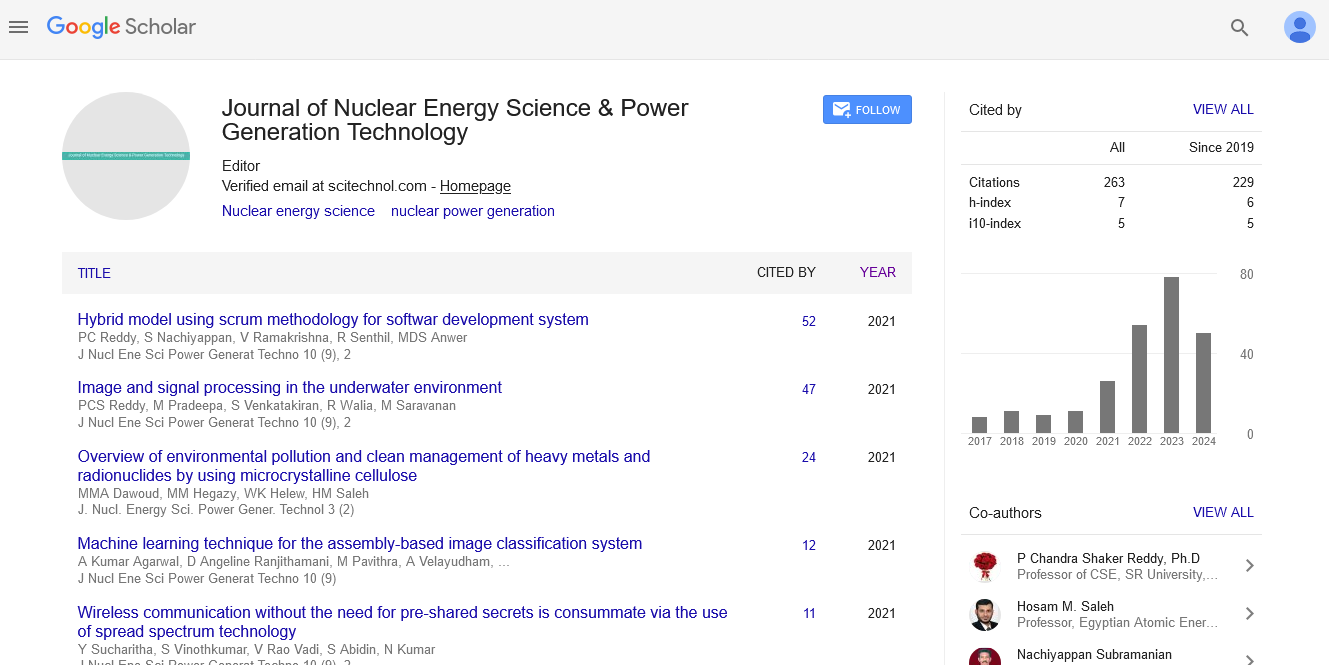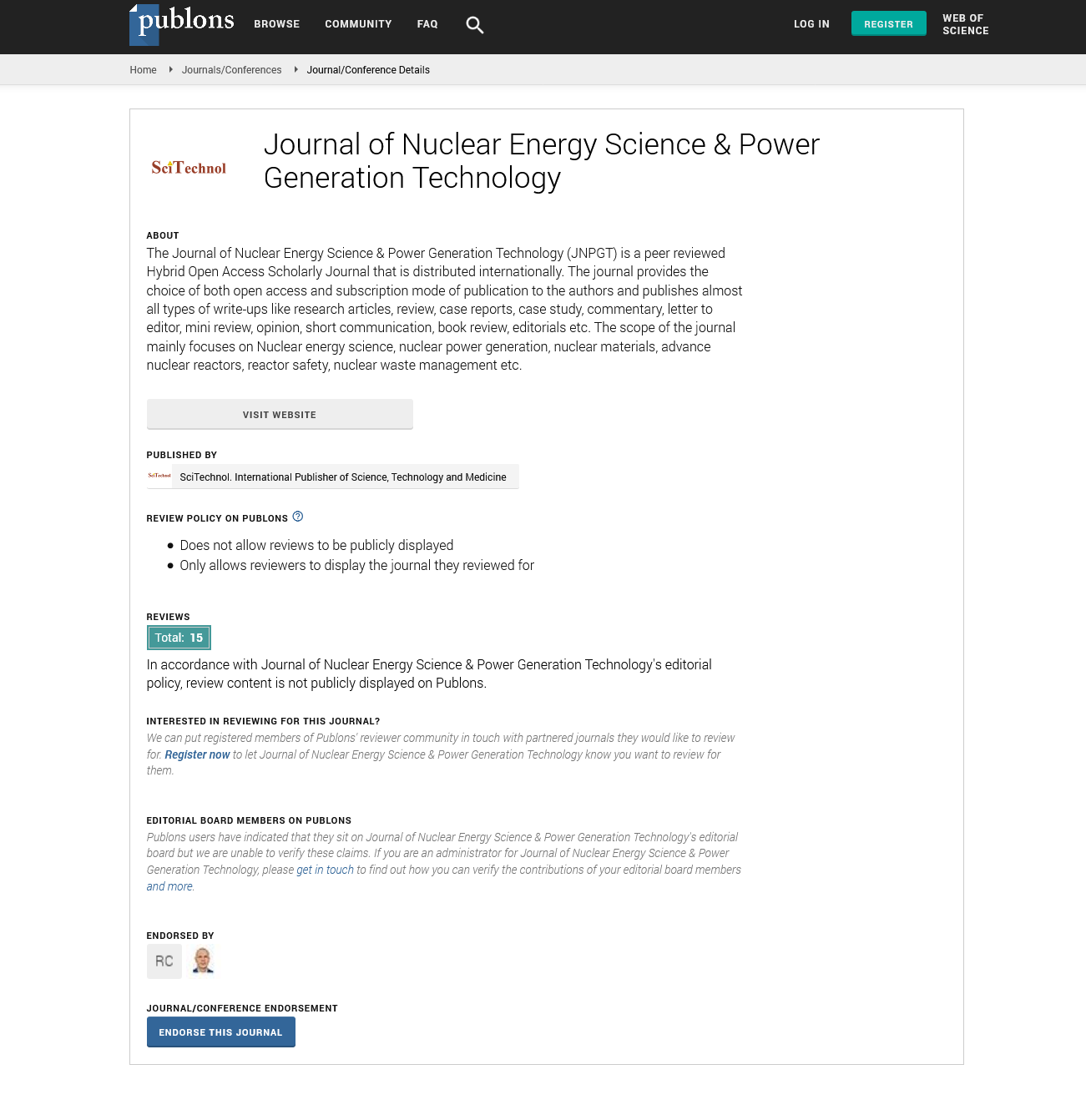Opinion Article, J Nucl Ene Sci Power Generat Technol Vol: 12 Issue: 2
Fossil Fuel Resources: Formation, Extraction and Impact on Energy Production
Yunhong Pan*
Department of Chemistry, University of Colorado Boulder, Boulder, USA
*Corresponding Author: Yunhong Pan,
Department of Chemistry, University of Colorado Boulder, Boulder, USA
E-mail: yunhongpan@colorado.edu
Received date: 22-Feb-2023, Manuscript No. JNPGT-23-95443;
Editor assigned date: 24-Feb-2023, PreQC No. JNPGT-23-95443 (PQ);
Reviewed date: 10-Mar-2023, QC No. JNPGT-23-95443;
Revised date: 17-Mar-2023, Manuscript No. JNPGT-23-95443 (R);
Published date: 27-Mar-2023 DOI: 10.4172/2325-9809.1000325
Citation: Pan Y (2023) Fossil Fuel Resources: Formation, Extraction and Impact on Energy Production. J Nucl Ene Sci Power Generat Technol 12:2.
Description
The Fossil fuels including coal oil and natural gas are the most widely used sources of energy worldwide. They have been essential in powering modern society and driving economic growth. However, as concerns about climate change and environmental sustainability continue to raise the mechanisms behind fossil fuel formation, extraction, and their impact on energy production is essiential. Fossil fuels are formed from the remains of ancient plants and animals that lived millions of years ago. Over time, these organic materials were subjected to heat, pressure, and chemical processes, resulting in the formation of coal, oil, and natural gas. Coal is a sedimentary rock that forms from the remains of plants that lived and died millions of years ago. Over time, the plant material accumulates in swamps and peat bogs, and as more layers of sediment build up, the heat and pressure transform the peat into coal. Different types of coal, such as lignite, bituminous, and anthracite, are formed depending on the degree of heat and pressure applied during the formation process. Oil and natural gas are formed from the remains of marine organisms, such as plankton and algae, which lived millions of years ago in ancient oceans. When these organisms die, their remains sink to the bottom of the ocean and get buried under sediment. Over time, the heat and pressure from the overlying sediment transform the organic matter into oil and natural gas through a process known as thermal maturation. Oil and gas then migrate through porous rock layers until they are trapped by impermeable rocks, forming oil and gas reservoirs.
Extraction of fossil fuels
Coal mining: Coal is typically extracted from underground mines or open-pit mines, depending on the depth and location of the coal deposit. Underground mining involves digging deep shafts or tunnels to access the coal seams, and then removing the coal using machinery and conveyor belts. Open-pit mining, on the other hand, involves removing the overlying rock and soil to expose the coal seam and extracting the coal using heavy equipment.
Oil and gas extraction: Oil and natural gas are typically extracted from underground reservoirs using drilling techniques. Wells are drilled into the earth's crust to access the oil or gas reservoir, and the oil or gas is then pumped or brought to the surface using various methods, such as hydraulic fracturing (fracking) or traditional drilling. Once extracted, oil and gas are transported through pipelines or shipped in tankers to refineries for processing.
Environmental impacts of fossil fuel
The combustion of fossil fuels, such as coal and oil, releases large amounts of greenhouse gases, such as carbon dioxide, into the atmosphere, contributing to climate change. Additionally, burning coal and oil releases harmful air pollutants, such as sulfur dioxide, nitrogen oxides, and particulate matter, which can have detrimental effects on air quality and human health. Fossil fuel extraction and processing can result in water pollution. For example, coal mining can result in the release of toxic chemicals and heavy metals into nearby rivers and streams, affecting aquatic life and water quality. Oil spills from offshore drilling can also cause severe damage to marine ecosystems.
 Spanish
Spanish  Chinese
Chinese  Russian
Russian  German
German  French
French  Japanese
Japanese  Portuguese
Portuguese  Hindi
Hindi 

